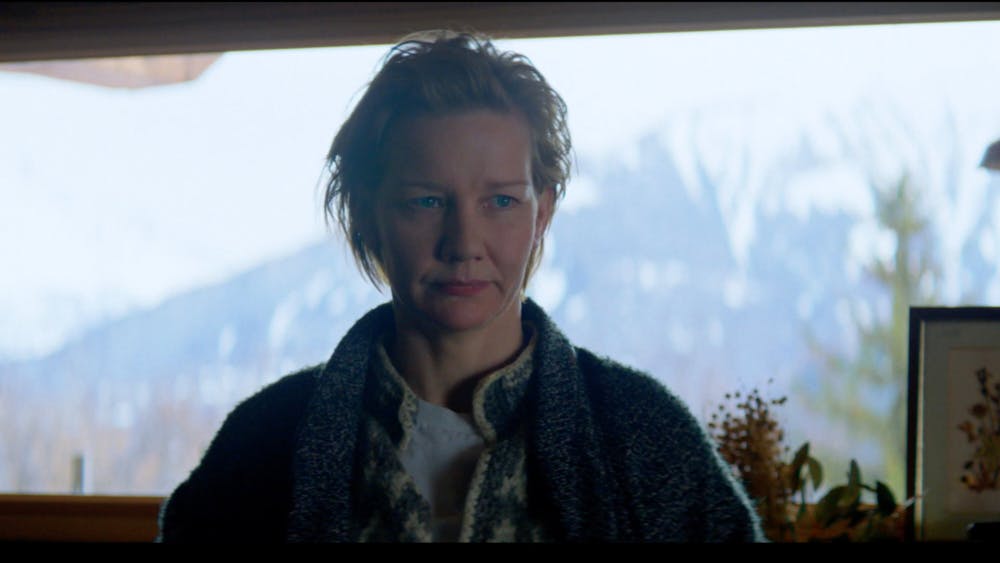Review: ‘Anatomy of a Fall’ tackles trauma

Score: ★★★★½
Justine Triet’s “Anatomy of a Fall” is the most recent recipient of the Cannes Film Festival’s highest award, making Triet only the third female director in history to win the Palme d’Or. Triet’s film joins the ranks of past legendary winners such as “Taxi Driver,” “Pulp Fiction” and “Parasite.” Triet’s stellar screenwriting and lead actress Sandra Huller are truly at the heart of this film, contributing to one of the best movie releases of the year.
The film follows Sandra Voyter (Huller), a well known author who is suspected of murdering her husband (Samuel Theis). The movie focuses on Voyter’s subsequent trial and how it affects her and the people around her, especially her pre-teenage son Daniel (Milo Machado Graner). The performances in this film are fantastic. Graner impressed with his turn as a child dealing with immense trauma. His vulnerable portrayal is at times confused and despairing, at other points strong and determined.
Huller is one of the best actresses of her generation and delivers possibly the most remarkable work of her career in this film, playing a woman who is simultaneously so vulnerable and yet, in many ways, impenetrable. She is deeply human, yet her face remains stony, making the movie’s central murder mystery more compelling as a result. Her interactions with her husband are some of the film’s most indelible moments.
As much as this film is a mysterious legal drama, it is also a film about marriage and family. Triet and her partner, Arthur Harari, wrote the film’s screenplay together over the course of the pandemic lockdown, an experience that likely seeps into the film’s in-depth discussion of relationships and marriage. Their screenplay is excellent, expertly juggling thrilling courtroom scenes and quieter character moments with ease.
Visually the film is never boring to watch. Triet clearly derives some influence from the handheld camera-obsessed Dogme 95 film movement with the depiction of the media circus that surrounds Voyter’s trial, which stands in stark contrast to the sequences in the beautiful snowy countryside of rural France.
This is not a movie that provides easy answers. It questions the nature of truth itself, taking a step beyond ambiguity to ask whether truth is something worth pursuing. Should we decide our own truth — and do we have any choice but to? Triet traverses these questions in a way that is unwaveringly engaging and effortlessly weaves philosophical ideas into the fabric of a courtroom nailbiter.
More from The Rice Thresher

Thresher’s guide to arts and entertainment in Houston
New to the city? Unsure how to spend your time procrastinating on homework? You’re in luck — Houston is a playground if you know where to look, and most of it is an easy metro ride or short commute from campus. Here’s a starter pack of spots that deliver fresh air, brain food and the occasional “wait, this is in Houston?” moment.

Thresher’s Lollapalooza report: Who ruled Grant Park?
Chicago’s Grant Park ran on pure dopamine this weekend — surprise debuts, late-but-worth-it arrivals, confetti, fireworks and at least three mass sing-alongs an hour. From Joey Valence & BRAE road-testing new indietronica to A$AP Rocky cracking open his vault, T-Pain turning the field into karaoke and Olivia Rodrigo summoning Weezer, Lollapalooza felt like a live-wire mixtape. Doechii built a universe, TWICE made history and Sabrina signed off with a superstar-cementing finale. Here’s what actually lived up to the skyline.
“Ginny & Georgia” Season 3: A Messy, Magnetic Villain Origin Story
I’ll admit it: I came into “Ginny & Georgia” expecting another glossy Netflix soap that looks great in a weekend binge but evaporates from memory by Monday. By the end of season three, I realized I’d been doing something I rarely do with shows like this: I was taking notes. Not on the plot (though it’s as twisty and outrageous as ever), but on the characters. I loved them. I was grinning from ear to ear watching them scheme, stumble and monologue their way through impossible situations. That’s when I knew: this show had done something right.


Please note All comments are eligible for publication by The Rice Thresher.